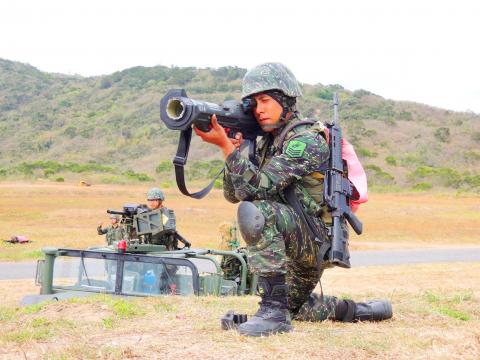Taiwan and the US have sealed a NT$3.8 billion (US$130.5 million) deal for 460 TOW-2B Aero radio frequency (RF)-controlled anti-tank missiles, which are to be delivered to Taiwan annually starting this year, with the final batch to be received by June 2024, a Ministry of National Defense source said yesterday.
The TOW-2B missiles are superior to the TOW-2A missiles the military currently uses in that they are wirelessly controlled rather than wire-guided, the source said.
The RF capability allows the missiles to more easily damage or paralyze enemy tanks by attacking them at more vulnerable points, the source said.

Photo: Lo Tien-bin, Taipei Times
After delivery of the missiles, the army’s anti-tank companies — on both Taiwan proper and its outlying islands — would have priority in deploying the missiles, the source said.
The TOW-2B’s maximum range of 4.5km allows it to be used not only in ground battles, but also to prevent enemy landings by engaging hovercraft and amphibious landing vehicles, the source said.
The sale is part of an arms package announced by the US in December 2015, originally for 769 TOW-2B RF missiles along with training equipment and support systems for a total of US$268 million, the source said.
After assessing the military’s equipment, the ministry elected to purchase 460 missiles due to a healthy number of TOW-2A missiles still in use, the source said.
The move was also a means to incentivize the Chungshan Institute of Science and Technology (CSIST) to make breakthroughs in research and development and produce anti-tank weaponry on a par with the TOW-2B, the source said.
The deal was officially signed by the Taiwanese defense attache and the American Institute in Taiwan, and was promulgated by the ministry on Thursday.
The CSIST is building missiles based on the Kestrel anti-armor rocket and has achieved multiple breakthroughs on key technologies, adding it is possible that the final product could produce an anti-tank missile at the level of the portable F6M-1HB Javelin or the TOW-2B.
The CSIST has also developed a Kestrel variant that can reach targets more than 1,200m away, a drastic improvement over the current Kestrel, which only has a range of 400m, the source said.
The CSIST’s Kestrel variant would be able to penetrate up to 400mm of rolled homogenous armor, which is an improvement on the original Kestrel’s penetration rate of 300mm, the source added.

GLOBAL ISSUE: If China annexes Taiwan, ‘it will not stop its expansion there, as it only becomes stronger and has more force to expand further,’ the president said China’s military and diplomatic expansion is not a sole issue for Taiwan, but one that risks world peace, President William Lai (賴清德) said yesterday, adding that Taiwan would stand with the alliance of democratic countries to preserve peace through deterrence. Lai made the remark in an exclusive interview with the Chinese-language Liberty Times (sister paper of the Taipei Times). “China is strategically pushing forward to change the international order,” Lai said, adding that China established the Asia Infrastructure Investment Bank, launched the Belt and Road Initiative, and pushed for yuan internationalization, because it wants to replace the democratic rules-based international

ECONOMIC BOOST: Should the more than 23 million people eligible for the NT$10,000 handouts spend them the same way as in 2023, GDP could rise 0.5 percent, an official said Universal cash handouts of NT$10,000 (US$330) are to be disbursed late next month at the earliest — including to permanent residents and foreign residents married to Taiwanese — pending legislative approval, the Ministry of Finance said yesterday. The Executive Yuan yesterday approved the Special Act for Strengthening Economic, Social and National Security Resilience in Response to International Circumstances (因應國際情勢強化經濟社會及民生國安韌性特別條例). The NT$550 billion special budget includes NT$236 billion for the cash handouts, plus an additional NT$20 billion set aside as reserve funds, expected to be used to support industries. Handouts might begin one month after the bill is promulgated and would be completed within

The National Development Council (NDC) yesterday unveiled details of new regulations that ease restrictions on foreigners working or living in Taiwan, as part of a bid to attract skilled workers from abroad. The regulations, which could go into effect in the first quarter of next year, stem from amendments to the Act for the Recruitment and Employment of Foreign Professionals (外國專業人才延攬及僱用法) passed by lawmakers on Aug. 29. Students categorized as “overseas compatriots” would be allowed to stay and work in Taiwan in the two years after their graduation without obtaining additional permits, doing away with the evaluation process that is currently required,

RELEASED: Ko emerged from a courthouse before about 700 supporters, describing his year in custody as a period of ‘suffering’ and vowed to ‘not surrender’ Former Taiwan People’s Party (TPP) chairman Ko Wen-je (柯文哲) was released on NT$70 million (US$2.29 million) bail yesterday, bringing an end to his year-long incommunicado detention as he awaits trial on corruption charges. Under the conditions set by the Taipei District Court on Friday, Ko must remain at a registered address, wear a GPS-enabled ankle monitor and is prohibited from leaving the country. He is also barred from contacting codefendants or witnesses. After Ko’s wife, Peggy Chen (陳佩琪), posted bail, Ko was transported from the Taipei Detention Center to the Taipei District Court at 12:20pm, where he was fitted with the tracking